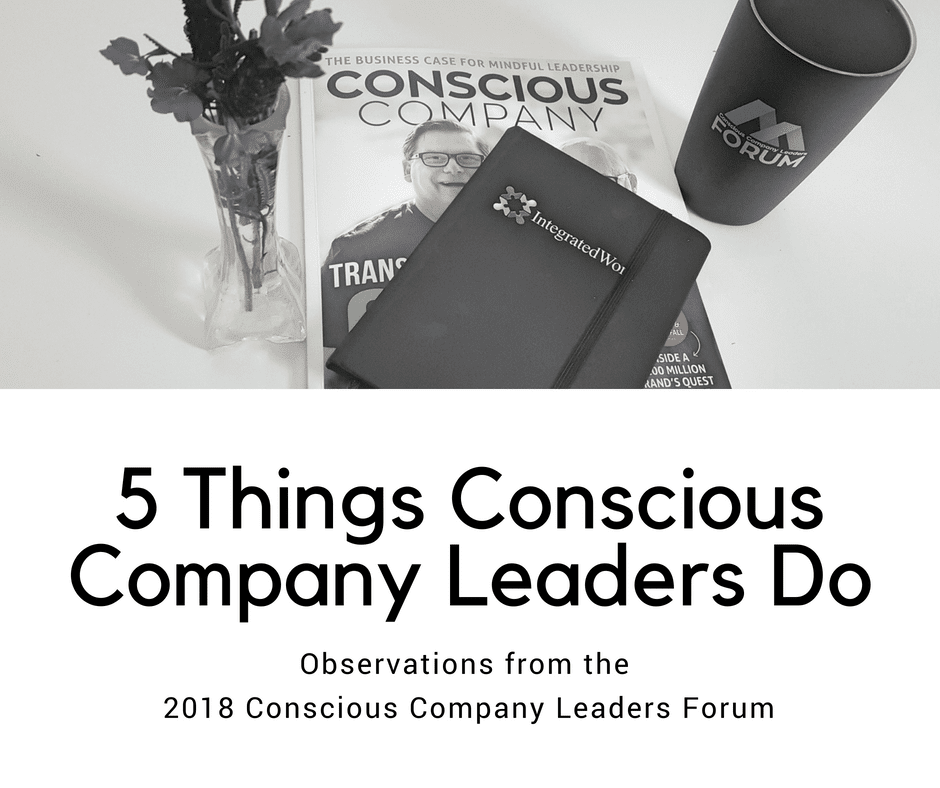By Kate Goff, R&D Manager at Integrated Work
“Change yourself. Then change your team. Then change your enterprise. Then change your business or industry. Then change the world.” This is how facilitator Jocelyn MacDougal summarized the “spiral” theme of the 2018 Conscious Company Leaders Forum, which I am still basking in the glow of.
Here are a few things the conference showed me about conscious leaders.
1) They know that stress reduction and burnout prevention aren’t “nice-to-haves.” They are absolute essentials to the mission. At Integrated Work, we know how burnout can destroy an organization. Wisdom Labs presented on improved workplace wellness through meditation and the RAIN of self-compassion method. They suggest reducing stress via a “tend and befriend” method, which puts the focus on someone else in need. Lorna Davis shared her humorous but potent “Oh @#&!” exercise: At the start of your week, look at your calendar. How many “Oh, @#&!” meetings and tasks do you see? And how many, “Oh, yay!” events do you see? What can you do to reduce or mitigate the Oh-@#&!’s, and harness and amplify the Oh-yay’s?
2) They take responsibility for redefining “success” in a way that goes beyond profit. Lynne Twist considered that business is now bigger than anything else on earth, including religion. When business aligns around common good, we can make a huge impact! Yet business has no moral compass built into it like religion or politics does. Conscious leaders can take responsibility for their positive impact on the world. They can work together as a movement to redefine success as more than profit and fame. And on an individual level, the workplace is an incredibly powerful place to make a positive change in someone’s life. CEOs and managers have the ability to create joy, wellness, satisfaction, and belonging for all their staff.
3) They aren’t afraid to rock the boat to support their mission. So many conscious business leaders shared how they’ve done what they aren’t “supposed” to do. They turned away from surefire success, fame, or profit to create a positive impact on the world. They spoke their truth, even when it upset the status quo. They put aside business models and partnerships that worked against their values. They stepped back from a thriving business when they sensed it was time to move toward a new, more heart-centered endeavor.
4) They take accountability for their impact on their staff and the world. They tackled tough topics around social justice and equity, even when it was uncomfortable. For instance:
Privilege: Most of the conference attendees came from privileged backgrounds of some sort. For many, that fact was uncomfortable, even shameful. Emily Lutyens said, “Let go of the shame of privilege, and focus on what really matters: what you do with your privilege.” After facing her own privilege while she was a student in India, she founded Legworks to create affordable, high-quality prosthetics, leveraging her profits in developed nations to offer the same high-quality products at subsidized prices in developing economies.
Diversity and Inclusion. People of color in attendance asked conscious leaders to consider workplace psychological safety. For instance, racial stereotypes of laziness discourage some people of color from taking part in employee wellness programs. Conscious leaders can take responsibility to encourage and reward them for participation. White leaders and male leaders can make the effort to bring women and people of color into the company’s inner circle and share high-level information with them that will propel them into high-level leadership positions. Michael Bush from A Great Place To Work shared a statistic from his work: 11% of employees have a disabled family member, and 80% do not tell their employer for fear of negative judgment. Supportive leaders might have to do some gentle inquiry to learn if any of their staff struggle with this difficult situation.
5) They understand the importance of vulnerability. Speaker Corey Blake told his fascinating, funny and occasionally scandalous personal story (playing basketball in the nude, anyone?) to show what happens when leaders are vulnerable and embody their authentic selves. Yes, vulnerability might repel those who dislike or disapprove of your story. But sharing your vulnerable moments only opens up more space to connect with those who are intrigued by you and your mission … and it happens faster because you aren’t wasting time on people-pleasing! The founders of Biggby Coffee also shared their heartfelt tale of workplace culture transformation. When they realized that they weren’t walking their talk about having a great company culture, the two founders asked painful questions about their own motivations and the true impact they were having on their staff (hint: it wasn’t rainbows and sunshine). By being open about their introspection and their challenges, Biggby coffee is now a very different place to work and they have the employee satisfaction metrics to prove it. The story is a real page-turner, which you can read in the Spring 2018 issue of Conscious Company Magazine.
It was wonderful to meet so many of our conscious company clients and colleagues. To follow up on everything I learned, I’ll be reading Tara Nichole Nelson’s Transformational Consumer book. And, of course, clearing my calendar for next year’s meeting!
